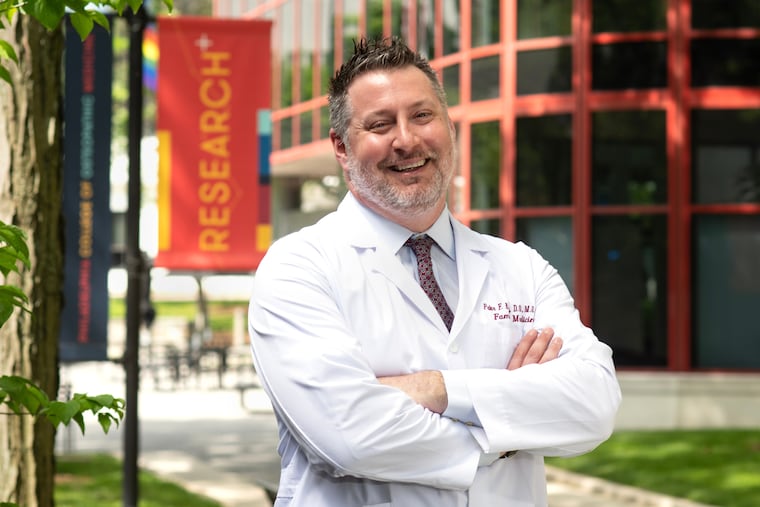Five questions with a new dean at Philadelphia College of Osteopathic Medicine
A Philadelphia native, Bidey has been on the PCOM faculty since 2012.

Peter F. Bidey is the new medical school dean at the main campus of Philadelphia College of Osteopathic Medicine.
But he’s hardly a new face.
Bidey, 41, graduated from the medical school in 2008, then did his residency at a PCOM-affiliated program at what is now called Suburban Community Hospital in East Norriton. After a year on staff at the hospital, he joined PCOM’s faculty in 2012. He took on academic positions of increasing responsibility while also practicing family medicine at PCOM’s outpatient clinics and at Lankenau Medical Center.
A Philadelphia native and graduate of Holy Ghost Prep in Bensalem, Bidey also has a personal bond with the 124-year-old medical school. He met his wife, psychiatrist Deana Bidey, there when the two were first-year medical students.
Physicians who practice osteopathic medicine, called D.O.s, are trained to focus on prevention and treating the patient as a whole. Compared to M.D.s, they get extra training in how the muscles, bones, and joints work together.
The Inquirer spoke with Bidey the week before June 1, the starting date of his new position. This is an edited and condensed transcript of our conversation.
The Philly area has seven medical schools, more than almost anywhere. How does PCOM stand out?
I think all the area medical schools create excellent physicians. However, I think the beauty of PCOM is that, first and foremost, we are an osteopathic medicine institution. We are also the third-oldest osteopathic medical school, so we have the tradition, connections, as well as an amazing faculty, staff, administration, student base, and alumni to help foster and nurture any new aspiring osteopathic physician.
A lot of PCOM graduates go into primary care, a specialty known for lower pay and burnout. What do you tell students about those challenges?
This is your career. You want to do something that interests you. Our students are prepared to go into whatever field that they choose. If you want to be a surgeon, you’ll receive the necessary training. If you want to go into emergency medicine, you’ll get the training. But we do have that whole-person perspective, that approach to our training, which lends itself very nicely to primary care.
You’re a family medicine specialist, meaning you provide primary care for all ages. What prompts some people to leave that field?
It’s a hard job. You’re seeing a lot of patients, and you’re taking on a lot of problems in a time where it’s desperately needed, and there’s a shortage to begin with. But I think it’s a calling. If it’s something that interests you, you rise to the challenges that are put in front of you.
What is the most common misunderstanding that people have about osteopathic medicine?
The main thing is just misinformation. When some people hear that we practice hands-on treatment, they wonder “Are we only doing that, or can we also give you antibiotics?” If you have pneumonia, I’m going to order a chest X-ray. I’m going to give you antibiotics. What any physician in the United States is going to do.
But I’ve got these other techniques that I can also do on top of those things to try to give you some relief, to try to help correct some of the dysfunction. Let’s say you have pneumonia and difficulty breathing. Maybe your ribs are not moving in and out as easily as they should. We have techniques that could help mobilize and relieve that dysfunction. I might ask you to breathe against me while I apply pressure. It’s a little bit of a different approach, but I think it’s what makes us unique.
When Sean Conley, an osteopath, treated President Donald Trump for COVID, some critics questioned his expertise. M.D.s and D.O.s alike rushed to his defense. How did that strike you?
He’s a trained physician, and I trust in physicians. I kind of look at it as, whether you’re in the physician realm, or whether you’re in the political realm, or whether you’re in the patient realm, there’s always misinformation. It’s our job to inform when there is misinformation.
It sounds as if PCOM is family for you, in more ways than one.
I owe PCOM a lot. I want to repay my debt to the school.
My dad is a retired Philly police officer. My mom was a secretary. I didn’t have a ton of physician connections until I went to PCOM. I did my residency here. I trained as a medical student here. I came back and worked here. I owe most of my medical career to PCOM, and even meeting my wife. I’m just proud that I can help in a new role.
It seems that teaching has been a key part of your career almost from the get-go.
That’s why I came back. Your patients are always the most important. But it’s also nice to give back. It’s nice that you’re helping train the future of our profession. I’m paying it forward.